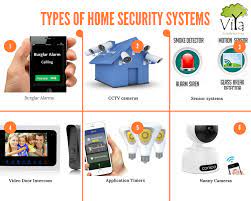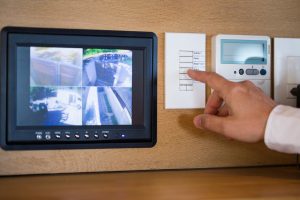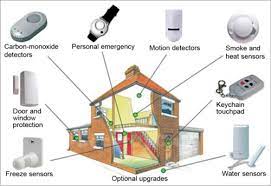Types of Security Systems | 3 Best Types of Home Security

There are a few different types of Security Systems to choose from whether you’re wanting to enhance your home alarm solutions or have a new one installed. In the United States, one out of every 36 homes is broken into each year. The good news is that burglaries have been proved to be deterred by security systems.
The topic that remains, and on which we will concentrate, is how to determine your home security system possibilities. They’re listed here, organized by main types.
How to Select Camera for Different Types of Home Security Systems?
If you choose the wrong cameras, your CCTV system will just be good for observation with poor picture detail, therefore keep the following considerations in mind to secure your house or business:
1. Type of camera
Bullet, dome, PTZ, and hidden cameras are the most frequent cameras used outside.
Consider the following:
- Where will they be used indoor or outdoor?
- Do they need to be inconspicuous, or would making themselves obvious be a better deterrent?
2. Resolution:
When it comes to the overall video quality of your security camera system, a resolution is crucial. A higher pixel count also helps digital zooming without causing excessive image blurring.
3. Lens:
Smaller focal length lenses are ideal for covering big regions, but the quality of detail in large areas is inadequate.
4. Sensor for images:
The image sensor’s quality will determine how well the image is reproduced inside the camera, including color reproduction, black and white tones, day and night, and so on.
7. Wireless Internet (WiFi):
In CCTV, the word “WiFi” refers to cameras that connect to a network. This uses radio transmission as well, but it is done digitally. Wifi units can be used to connect IP cameras and DVRs for remote access.
What Are the Different Types of Home Alarm Systems to be Considered?

We explain the many types of alarm systems and how they work to help you choose the best solution for your house.
1. Electric Current Alarm System:
These systems are the most basic monitoring tool that simply monitors access points such as doors and windows and are frequently installed during the construction of a home. A low-voltage electrical circuit passes between two sites in these systems.
2. Alarm System (Wired);
Your landline phone connection is used by a wired security system to send signals to a monitoring center. Because there is a risk of actual onsite lines being cut or destroyed, making the system worthless, cellular backup is recommended to prevent weather or other landline interference.
3. Home Security System (Wireless):
A control panel and a set of sensors are commonly used in these alarm systems, which are connected via built-in radio frequency transmitters. They integrate with other smart home features such as lights, video cameras, and thermostats, and enable remote system management via your mobile device.
4. Home Security System (Monitored)
In the event of a break-in, a monitored home alarm system ensures that authorities are notified quickly, 24 hours a day, seven days a week. The alarm can be activated by opening a door, movement in the house via motion sensors, a loud sound via auditory sensors, or manually, depending on the types of security systems you have installed.
5. Home Security System (Unmonitored )
This system, often known as “local” alarms, relies on you or someone nearby to notify authorities in the event of an emergency. Audio and visual alerts are activated when your system is tripped by an unmonitored system.
This system is less expensive, but it does not provide the same level of protection because it does not notify a monitoring center of your emergency, which would then dispatch first responders.
Types of Home Security Systems- Pros & Cons:
Because security systems come in a variety of shapes and sizes, ensuring that your home’s security system can safeguard your loved ones and possessions is just as vital as the property itself.
1. Monitored Security Systems:
- Self-Monitored Security Systems
- Company Monitored Security Systems
Normally, when the system detects a robbery, fire, or other emergencies, it will notify a call center, security team, or emergency responders.
This system comes in two types:
a. Self-Monitored Security Systems:
Motion sensors, door sensors, security cameras, and sirens that call or text your phone when triggered are all part of these systems. You have the ability to monitor and manage yourself.
You have the option of phoning 911 or requesting a neighbor to investigate for signs of a break-in, when you receive a notification and are not at home, you have the option of phoning 911 or requesting a neighbor to investigate for signs of a break-in.
Features:
- Accessible apps
- Easy-to-use cameras
- Video doorbells
- Smart home device compatibility
Pros of these types of security systems:
- They are convenient and may be quickly moved to another location.
- When the system is turned on, you’ll get a real-time notification.
- Using their video systems, trespassers can be tracked and recorded.
- Self-monitored security systems are not prohibitively expensive.
Cons of these types of security systems:
To work, you’ll need a wireless connection. If there is a power outage, it will not work.
If you’re in an area without cell coverage, you can miss an intruder alert.
The majority of self-monitored systems lack alarm systems to deter attackers.
Their camera systems’ coverage is confined to the area where they’re installed. Moreover, many installations are costly.
The best 4 self-monitored types of home security systems:
- Abode: Best for smart homes
- Scout Alarm: Best RFID option
- Ring Alarm: Best budget buy
- Samsung SmartThings: Best smart home hub
b. Company Monitored Security Systems:
Door sensors, motion detectors, cameras, glass-break sensors, loud sirens to terrify attackers, and silent alarms are examples of these types of security systems. They are controlled by Professional organizations and employees.
Additionally, you will receive a verification phone call to ensure that the alarm system was not accidentally activated.
Pros of these types of security systems:
- It will assist them in continuing to work in the event of a power loss.
- If your phone is out of reach, you do not need to contact or call the authorities yourself.
- As soon as intruders access your home, the alarm and sirens are more than enough to scare them away.
- They can cover the entire house and remove any blind spots.
Cons of these types of security systems:
- If the system is mistakenly activated, you must answer your phone to turn it off.
- It’s possible that you’ll be charged for making a false alarm.
- For the alarm system to work, you must always activate it before going to sleep or leaving your home.
- A monthly subscription and contract are normally required for this types of security system.
2. Unmonitored Security Systems:
These types of security systems are ideal for securing your home. When the alarm is triggered, this system activates a thunderous siren within and outside your home.
Motion sensors, control panels, glass-break sensors, sirens, door and window sensors, and smoke detectors are all part of unmonitored security systems and can be installed by yourself or by a professional.
Pros of these types of security systems:
- It isn’t as advanced or thorough as monitored systems and is less expensive
- Self-contained or more static security systems are frequently available, making them easier to use and maintain.
- Because there are no subscription or recurring expenses, they are more cost-effective.
Cons of these types of security systems:
- The majority of unmonitored security systems rely mainly on the owner.
- In an emergency, contact with law enforcement can be difficult because these techniques are not automated.
- Security systems that are not monitored are less secure and reliable than those that are.
3. Wireless Security Alarm Systems:
Detectors, sensors, cameras, alarms, and the primary control panel are common components of wireless security systems. Such systems likewise feature a three-step process, which includes:
Detection: It’s the first phase in the procedure, and it involves detecting any changes in your home’s security status.
Annunciation: This notifies the homeowners of a possible break-in or danger on the premises.
Monitoring: When an emergency or threat occurs, the system activates the alarm and sends a notification to the monitoring provider.
Pros of these types of security systems:
- Installing and uninstalling is simple. If you wish to move to another home or change the position of your house alarm system, it will be simple to do so.
- It’s simple to move gadgets around and add new ones to the system.
- For burglars, there are no cables to cut.
- Remote controllers make it simple to operate them.
- Without the use of control panels, you can effortlessly check your home security system.
Cons of these types of security systems:
- It’s resistant to manipulation. Interference can affect wireless security systems, even if it isn’t widespread.
- You’ll require a large number of batteries. The majority of wireless detecting gadgets require batteries to operate.
- Some people even require landlines in order to connect to a monitoring service.
4. Wired Home Security Systems:
The components of wired home security systems are connected to a low-voltage alarm panel. All of your home’s entry points, as well as motion detectors, keypads, and other security systems, will be hooked back to the main control panel.
Pros of these types of security systems:
- They are not based on sensors that communicate via radiofrequency.
- Simple to maintain because all you have to do is replace the batteries to keep them running.
- Larger homes benefit from hardwired security systems because they can accommodate more sensors.
- Wireless systems are more vulnerable to hacking than wired systems.
- Professionals appreciate and prefer security system connections that are wired.
- First-class units with high-definition video surveillance and control panels in numerous rooms for wired systems.
Cons of these types of security systems:
- It has high installation expenses because the security equipment is installed by professionals.
- Robbers are more likely to target these systems.
- Because the security system is installed by professionals, the installation costs are significant.
Some other types of home security systems:
Other types of security systems include:
- Wireless security system,
- Smart security systems
- Local alarm systems
Wireless security system:
They have no cables and rely on a combination of batteries, Wi-Fi, and/or cellular backup to connect to the app and, if applicable, the monitoring center.
Smart security systems:
They are internet-connected, allowing users to view live video via a smartphone app, receive alarm notifications, and manage the system remotely.
Local alarm systems:
They are not connected to the internet, thus there is no remote control, monitoring, or notification, unlike smart systems.
The 10 Best Systems for different types of Security Systems:
The best type of home security camera system keeps you safe from break-ins and allows you to monitor your home from afar.
- ADT Home Security: Best Overall
- SimpliSafe: Best for Easy Installation
- Abode: Best for Customization
- Vivint: Best for Smart Home Integration
- Frontpoint: Best for Smartphone Integration
- Alder: Best for Medical Alerts
- Canary: Best for Two-Way Audio
- Scout: Best for Disaster Prevention
- Blue by ADT: Best for Beginners
Home security features:

Ask yourself what you want to protect before deciding on a home security system. What you intend to do with your system will determine the best equipment package, financing plan, and features for you. There are three primary types of security system packages available on the market today:
Smart home automation:
You can leave the lights on while you’re gone or let the dog walker in while you’re gone.
Security equipment:
They are useful if you’re concerned about issues like intrusion, theft, or vandalism.
Environmental monitoring:
Smoke alarms, pipe freeze detectors, and leak detectors are examples of this type of equipment.
What are the different types of home security systems?
Some other types of security systems are:
Landline security systems: They connect security gadgets and monitoring over a residential phone line and aren’t as common.
Broadband security systems: Using your home’s internet connection, connect to the professional monitoring center. As a result, if your home’s Wi-Fi goes down, your security system goes down with it.
Cellular services: are comparable to broadband security systems in price, but you won’t have to worry about hardwiring or power outages.
What is DIY Wireless Home Security Systems?
To determine which types of security systems are best for you, compare a DIY home security system to one that has been professionally installed. Let’s overview DIY Wireless Home Security Systems and Professionally Installed Home Security Systems:
DIY Wireless Home Security Systems:
These security systems are sold in pre-assembled kits that you must connect yourself.
With DIY home security systems, the user assembles the system and, most often, monitors it via a mobile app.
The majority allow you to monitor your system for free via a smartphone app, but a few require you to pay for professional monitoring.
Pros of DIY types of security systems:
- Provide you with greater flexibility and, in most cases, lower monthly monitoring expenses than professionally installed systems.
- You are not required to sign a multi-year contract in most cases.
- Easy to personalize and grow with new sensors and accessories throughout the time
Pros of DIY types of security systems:
- You must set up the system on your own.
If you don’t sign a contract, your equipment prices may be greater. - Furthermore, self-monitored systems are not supervised by skilled personnel 24 hours a day, seven days a week.
- —missing a smartphone alert at a vital time might give a criminal enough time to break inside your home.
Professionally Installed Home Security Systems?
These types of security systems are professionally installed and monitored 24 hours a day, seven days a week. Although many systems come with a smartphone app for remote control and monitoring, some providers demand a premium monthly price to use it.
Pros of Installed types of security systems:
- It’s possible that you’ll save a bunch of costs on equipment.
- The system is set up for you by a specialist.
- A professional is continually keeping an eye on your system.
Cons of Installed types of security systems:
- The average monthly charge is roughly $40 or more.
- You’ve committed to a multi-year deal.
FAQs:
What are Security System Sensors & Components?

Individual sensors—battery-powered gadgets ranging in size from a pack of gum to a huge box of matches—make up these types of home security systems. the components found in most basic types of home security systems are arranged in order of relevance to the total system.
A base station, a keypad (or touch-screen control panel), contact sensors, and motion sensors are generally included in DIY security system kits.
Most security systems also have a selection of add-on sensors and components, which come at a premium.
What are the Best Types of Security Systems for Affiliate Programs?
Let’s look at 5 of the best home security affiliate programs and pick a niche to focus on. You might choose to concentrate on video surveillance security solutions.
- Blink Home Security Affiliate Programs:
- ADT Security Affiliate Program
- Brinks Affiliate Program:
- Revo Security Affiliate Program:
- Hippo Home Security Affiliate Programs:
Types of Security Systems | 3 Best Types of Home Security
We cover in the post: Different types of home security systems – the best type of home security camera system – the best type of home security system – different types of home security systems – different types of home alarm systems – different home alarm systems





